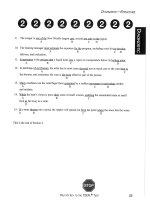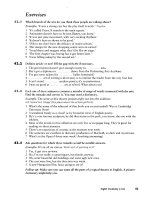Atc practist test english 4 pdf
Bạn đang xem bản rút gọn của tài liệu. Xem và tải ngay bản đầy đủ của tài liệu tại đây (487.94 KB, 6 trang )
Practice 6
Part A: Insert commas where necessary.
1. He said “There’s nothing else to say.”
2. I want to change majors but I need to get my advisor’s approval first.
3. Did you notice by the way that she didn’t even say hello?
4. What did you say Louise?
5. There’s one thing however that I forgot to mention.
6. I think he went to Woodson which is a Montessori school last year.
7. The Constitution gives us the right to life liberty and the pursuit of happiness.
8. One July 1 1981 I met the woman who would become my wife.
9. We met in Toledo Ohio where she was born.
10. She was a lonely quiet girl.
Part B: A common problem in writing is superfluous (unnecessary) commas. Delete any unnecessary
commas in the sentences below.
1. Ken Kesey wrote, One Flew Over the Cuckoo’s Nest, which is now a classic.
2. Did you know, that Bob Dylan’s real name, is Bob Zimmerman?
3. I usually run, before I eat breakfast, if possible.
4. The roses are blooming, in the yard, again.
5. I went back-to-school shopping and got, notebooks, paper, and blank disks, for us.
6. The man, who called you yesterday, is on the phone again.
7. John, please give me the money, that you owe me, by Friday.
– ACT ENGLISH TEST PRACTICE–
54
– ACT ENGLISH TEST PRACTICE–
55
8. I said, “Put your money where your mouth is.”
9. Give me, that disk, please.
10. Charles, ate the whole pizza himself!
Answers
Part A
1. He said,“There’s nothing else to say.”
2. I want to change majors, but I need to get my advisor’s approval first.
3. Did you notice, by the way, that she didn’t even say hello?
4. What did you say, Louise?
5. There’s one thing, however, that I forgot to mention.
6. I think he went to Woodson, which is a Montessori school, last year.
7. The Constitution gives us the right to life, liberty, and the pursuit of happiness.
8. On July 1, 1981, I met the woman who would become my wife.
9. We met in Toledo, Ohio, where she was born.
10. She was a lonely, quiet girl.
Part B
1. Ken Kesey wrote One Flew Over the Cuckoo’s Nest, which is now a classic.
2. Did you know that Bob Dylan’s real name is Bob Zimmerman?
3. I usually run before I eat breakfast, if possible.
4. The roses are blooming in the yard again.
5. I went back-to-school shopping and got notebooks, paper, and blank disks for us.
6. The man who called you yesterday is on the phone again.
7. John, please give me the money that you owe me by Friday.
8. I said, “Put your money where your mouth is.”
9. Give me that disk, please.
10. Charles ate the whole pizza himself!
P
UNCTUATION AND SENTENCE BOUNDARIES
Clearly indicating where sentences begin and end is essential to effective writing. Two of the most common
grammatical errors are sentence fragments and run-ons. Because punctuation is essential to separating and
connecting sentences, this important grammar review is here in the punctuation section.
Incomplete Sentences (Fragments)
As stated earlier, a complete sentence must: (1) have both a subject (who or what performs the action) and
a verb (a state of being or an action); and (2) express a complete thought. If you do not complete a thought,
Comma Confusion
A common question about commas is whether or not you need a comma after the second to last item in
a list (also known as a serial comma):
I bought milk, eggs, bread, and butter.
I bought milk, eggs, bread and butter.
Many grammar books will tell you that this last comma is optional. Our advice is to err on the side of clar-
ity and use the comma. Notice, for example, how not having that last comma can lead to confusion:
I bought milk, eggs, rice and beans.
Did you buy rice and beans separately, or a dish of rice and beans? Without the comma, it’s unclear.
In any case, you should definitely not put a comma before the first item in the list, as in the following
sentences:
I bought, milk, eggs, rice, and beans.
Correct:
I bought milk, eggs, rice, and beans.
56
or if you are missing a subject or verb (or both), then you have an incomplete sentence (also called a sentence
fragment). To correct a fragment, add the missing subject or verb or otherwise change the sentence to com-
plete the thought.
I
ncomplete: Which is simply not true. [No subject. (Which is not a subject.)]
C
omplete: That is simply not true.
I
ncomplete: For example, the French Revolution. [No verb]
C
omplete: The best example is the French Revolution.
I
ncomplete: Even though the polar icecaps are melting. [Subject and verb, but not a com-
plete thought.]
C
omplete: Some people still don’t believe in global warming even though the polar ice-
caps are melting.
Run-On Sentences
A run-on sentence occurs when one sentence “runs”right into the next without proper punctuation between
them. Usually, there is either no punctuation at all or just a comma between the two thoughts. But commas
alone are not strong enough to separate two complete ideas.
There are five ways to correct run-on sentences:
1. With a period.
2. With a comma and a coordinating conjunction: and, or, nor, for, so, but, yet.
3. With a semi-colon.
4. With a dash.
5. With a subordinating conjunction to create a dependent clause: although, because, during, while, etc.
Here’s a run-on sentence corrected with each of the techniques listed above:
Run-on: The debate was over, now it was time to vote.
Period: The debate was over. Now it was time to vote.
Comma + conjunction: The debate was over, and now it was time to vote.
Semi-colon: The debate was over; now it was time to vote.
Dash: The debate was over—now it was time to vote.
Subordinating conjunction: Since the debate was over, it was time to vote.
Practice 7
Rewrite the paragraph below to correct any run-ons or sentence fragments.
I was in the middle of a movie. When the telephone rang. It was my brother, he was calling
to tell me he got a new job. Which was really great news. Because he’d been unemployed for five
months. He’d been laid off along with thirty others at his company. Fortunately for him. The new
job pays better than his old one, and he has more flexible hours, he starts the new job on Mon-
day.
Answer
Your answer may vary slightly.
I was in the middle of a movie when the telephone rang. It was my brother. He was calling
to tell me he got a new job, which was really great news because he’d been unemployed for five
months. He’d been laid off along with thirty others at his company. Fortunately for him, the new
job pays better than his old one, and he has more flexible hours. He starts the new job on Mon-
day.
– ACT ENGLISH TEST PRACTICE–
57
Basic Grammar and Usage
Grammar and usage refer to the rules that govern the form of the words we use and how we string those
words together in sentences. Like punctuation, correct grammar and usage are essential for clear and effec-
tive communication. In this section, you will review the following areas of basic grammar and usage:
1. verbs—conjugation and usage
2. consistent verb tense
3. subject-verb agreement
4. gerunds and infinitives
5. pronouns
6. pronoun-antecedent agreement
7. comparative and superlative adjectives and adverbs
(Sentence fragments and run-ons were reviewed in the previous section.)
Verbs—Conjugation and Usage
Verbs are the “heart” of a sentence. They express the action or state of being of the subject, telling us what
the subject is doing, thinking, or feeling.
He raced to the door.(action)
She feels really lucky to be here. (state of being)
I am absolutely famished. (state of being)
I should give him a call. (action)
Verbs have five basic forms:
1. Infinitive base: the base form of the verb plus the word to.
to go to be to dream to admire
To indicate tenses of regular verbs (when the action of the verb did occur, is occurring, or will
occur), we use the base form of the verb and add the appropriate tense endings.
2. Present tense: the verb form that expresses what is happening now.
I am sorry you are not coming with us.
Jessica does yoga every morning.
– ACT ENGLISH TEST PRACTICE–
58
The present tense of regular verbs is formed as follows:
SINGULAR PLURAL
first person (I/we) base form (believe) base form (believe)
second person (you) base form (believe) base form (believe)
third person (he/she/it, they) base form + -s/-es (believes) base form (believe)
3. Present participle: the verb form that describes what is happening now. It ends in -ing and is accom-
panied by a helping verb such as is.
Jessica is doing
a difficult yoga pose.
Stocks ar
e falling again in response to another corporate scandal.
NOTE: Words that end in -ing don’t always function as verbs. Sometimes they act as nouns and are
called gerunds. They can also function as adjectives (called participial phrases).
Present participle (verb): He is lo
ading
the boxes into the car.
Gerund (noun): This parking area is for lo
ading
only.
Participial phrase (adjective): The lo
ading
dock is littered with paper.
(You will learn more about gerunds later in this section.)
4. Past tense: the verb form that expresses what happened in the past.
It snowed yesterday in the mountains.
I f
elt better after I stretched and did some deep breathing.
5. Past participle: the verb form that describes an action that happened in the past and is used with a
helping verb, such as has, have, or had.
It has
not snowed all winter.
I ha
ve waited as long as I can.
– ACT ENGLISH TEST PRACTICE–
59









